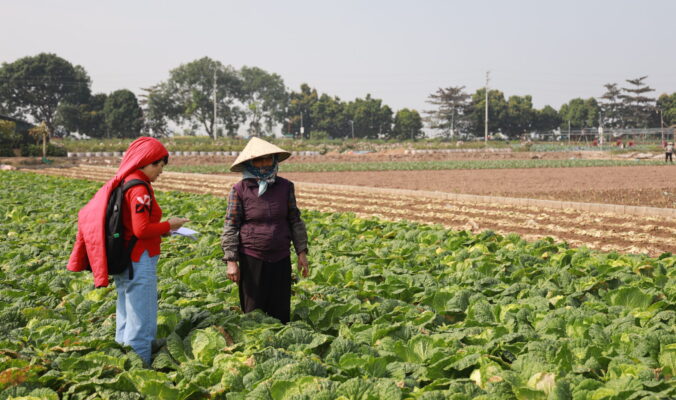The Safe Food for Growth (SAFEGRO) Project, funded by Global Affairs Canada, is dedicated to promoting gender equality (GE) and empowering women in specific value chains. Gender mainstreaming is a strategy for achieving the SAFEGRO Project’s goals of gender equality and women’s empowerment. To benefit all stakeholders, gender mainstreaming will be implemented throughout the Project cycle.
From November to December 2022, gender-based vegetable value chain surveys were conducted at three cooperatives: Van Duc Cooperative, Bac Hong Cooperative, and Yen My Cooperative, all of which are located in the Hanoi suburbs of Gia Lam, Dong Anh, and Thanh Tri.

The gender-based value chain survey aims to identify gender gaps, and to address them with interventions aimed at empowering women and disadvantaged groups, to ensure that all participants in the value chain benefit equally.
The survey of the vegetable value chain used a participatory and feminist approach. The survey interviewed male and female farmers, traders (collectors, wholesalers, and suppliers), agents providing input materials, convenience stores, supermarkets, and collective kitchens. Participants can participate in discussions and share ideas about each stage of the value chain, from producers to consumers. Furthermore, the feminist approach was used in the research and survey process. From research design to data collection, analysis, and action planning. Furthermore, the value chain survey includes representative groups and in-depth consultation to determine which structural determinants are barriers to gender equality and opportunities to empower women. The gender-based value chain survey will examine the gender roles of men and women at each stage of the value chain, as well as the ability of men, women, and weak groups to access and control resources.
According to the findings of a survey conducted with members of Van Duc cooperatives, the majority of field laborers are men and women aged 45 and up. In a cooperative in Hanoi’s outskirts, the elderly aged 60 to 70 account for the majority of the labor force.

In agricultural production, the traditional division of labor is still in place. In this traditional division, women not only work as the primary workers in most stages of vegetable production, but they also play an important role in unpaid work such as childcare, cleaning, and cooking for the entire family.
Women oversee the majority of food choices for the entire family. They are prioritized in food safety training and communication at the cooperative. This fact indicates that the goal of changing food safety awareness and behavior should continue to focus on the group that makes food selection decisions for the family. To avoid putting additional pressure on women to do unpaid work, food safety communication will target both men and women. Because, contrary to what survey participants expected, housework is not gender discriminatory.

